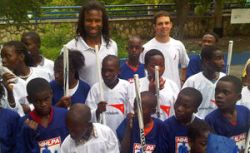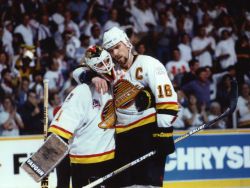Three More Reasons to Love the Vancouver Canucks
BLOG POST posted on February 24, 2011 by Michael
As I write this, the Vancouver Canucks are in the number one spot in the National Hockey League (NHL). Canucks forward Daniel Sedin currently has the most points in the league, and his twin brother Henrik has the third most points (Henrik won the Hart Trophy for most points in the NHL last season).
The Sedins are not the only reason why many feel the Canucks have a great shot at the coveted Stanley Cup this season, the Canucks goalie Roberto Luongo is fresh off leading Team Canada to a gold medal in Vancouver last year, and continues to have an extraordinary winning record. With the additions of Keith Ballard and Dan Hamhuis, the depth of the Canucks defense is impressive. Also, the Sedin brothers are not the only forwards finding the back of the net: many forwards, including Ryan Kesler, are having an outstanding season.
There is no question about it, the Vancouver Canucks are an exciting team to watch this season based solely on their on-ice achievements. However, I am going to give fans of hockey and social justice three more reasons to love the Vancouver Canucks.
Reason number one, Dan Hamhuis and Haiti.
In 2004, Canada helped back a coup against Haiti’s democratically elected President, Jean-Bertrand Aristide. This was an unfortunate decision, as it helped to further destabilize Haiti politically, instead of allowing Haiti to address the country's immense poverty (Haiti is the second poorest country in the western hemisphere).
Thus, on January 12, 2010, when a massive earthquake struck Haiti, the country suffered greatly due to the magnitude of the natural earthquake, as well as the country's political turmoil and extensive poverty.
Again, Canadian politicians were offside in responding to Haiti’s plight. Instead of sending emergency rescue teams trained to deal with disasters like earthquakes, Canada militarized its aid to Haiti. If I was ever trapped under a building, I would want an expert in search and rescue, backed by acute health care professionals sent to help me, not experts in hand to hand combat and the use of firearms (1). Thus, when the Vancouver Canucks’ Dan Hamhuis visited Haiti in June 2010, half a year after the earthquake, the country was still in ruins (2).
Unlike the armed soldiers Canada sent to Haiti, Dan Hamhuis went to Haiti armed with sports equipment donated by local stores from his home town of Smithers, BC; Hamhuis went down with an open mind and a good heart to show solidarity with the Haitian peoples and to raise awareness to their ongoing struggle. Canadian politicians can learn a lot from the Vancouver Canucks blue liner, Dan Hamhuis.
Reason number two, the Sedin brothers and Vancouver Children’s Hospital.
Vancouver is a world-renowned city. It consistently gets voted one of the world’s most livable cities. Nevertheless, Vancouver has its problems. Vancouver is the largest city in the province of British Columbia. BC has the country's highest child poverty rate (one out of every ten children live in poverty) and BC has the lowest minimum wage in the country, $8 and it hasn’t increased in ten years (3).
Health Canada states that income is the number one determinant of health (4), as such, one out of every ten children in BC have the odds stacked against them for maintaining good health status; however, where the politicians and policy makers of British Columbia have failed the children of BC, good people like the Sedin brothers have helped.
In March 2010, Daniel and Henrik donated $1.5 million dollars towards the new B.C. Children’s Hospital (5). This money was donated quietly, with not too many people knowing about it (there was no “Sedin action plan” sign plastered for all to see following the donation).
The Sedins came to Vancouver ten years ago, and they have ignited the province on and off the ice. On the other hand, the province’s politicians have stagnated the minimum wage for ten years, compromising the health of the province’s people, including children. BC politicians and employers can learn a lot from the compassion of the Vancouver Canucks elite forwards, Daniel and Henrik Sedin.
Reason number three, Trevor Linden and the NHL Players’ Association.
Trevor Linden is regarded as a Vancouver Canucks hero. In 2008, his jersey was retired as a symbol of how meaningful his career as a Vancouver Canuck has been to the fans and franchise. Linden not only led the Canucks to game seven in the Stanley Cup Finals with a work ethic that legends are made of, he also worked on behalf of all players in the NHL Players’ Association.
In the two countries where NHL teams are located, the U.S. (24 teams) and Canada (6 teams), the disparity between the rich and poor is growing considerably. Right now in the U.S., the top one-hundredth of one percent make an average of $27 million per household, while the average income for the bottom 90 percent is $31,244 (6). Similarly, within the past 12 years in Canada, there’s been a 444 per cent salary increase for the country's top CEOs. The top 10 earners collected $330.3 million in 2007 from $60.7 million in 1995 (7).
Hockey players go on the ice every night and give 100% for their teammates, their communities, and the millions of fans that look up to and draw inspiration from them. Just like working class women and men, hockey players deserve a fair wage.
Trevor Linden’s work on behalf of NHL players in the NHL Players’ Association is tantamount to his work on-ice as the Canuck’s captain. During the 2004-05 NHL lockout, Linden worked tirelessly to ensure a fair deal between players and the owners was reached. As the disparity between the rich and poor continues to grow, we can look to the hard work of the Vancouver Canuck hero Trevor Linden as an inspiration to work towards a more egalitarian society, where wealth is more evenly distributed.
While Linden's work on behalf of rich hockey players may not be as profound as the trials of everyday workers, such as those currently struggling for collective bargaining rights in Wisconsin; the fact that Linden worked to ensure that the mega-rich NHL owners didn't gain even more on the backs of the hockey players, who do the real work in the sport, is something worth honouring.
The work of these players off the ice, compounded with their hard work, skills and determination demonstrated on the ice, gives us even more reason to celebrate the Vancouver Canucks. For their work with international solidarity, sick children, collective bargaining, positioning, passing, hitting, saving, and scoring, we have many reasons to love the Vancouver Canucks.
References:
1. http://yvesengler.com/2010/10/20/un-vote-reveals-what-world-thinks-of-ca...
3.http://www.theprovince.com/business/shamed+global+stage+legislated+poverty/3921119/story.html
4. http://www.phac-aspc.gc.ca/ph-sp/determinants/determinants-eng.php#income
5. http://www.theprovince.com/sports/sedins+donate+million+toward+children+...
6. http://motherjones.com/politics/2011/02/income-inequality-in-america-chart-graph
7. http://www2.macleans.ca/2009/05/01/the-rising-salaries-of-canadas-top-50...
8. http://bcchf.wordpress.com/2010/03/11/bc-childrens-scores-a-goal-with-the-help-of-the-sedins/
9. http://canucks.nhl.com/club/news.htm?id=453227
The site for the Vancouver local of The Media Co-op has been archived and will no longer be updated. Please visit the main Media Co-op website to learn more about the organization.



Comments
OMG
You are kidding, right?
Is this an elaborate form of sarcasm?
That sport is so ridiculous and filled with violence, male privilege and just plain ol' oppressive crap. Charity? Oh my!
Tami
Tami.
No one, and I MEAN no one, wants to hear your negativity, Tami.
this article was published to show the good that the players are doing off the ice... the benefit others are obtaining with the privilege the players have been granted. your negativity is something that is bringing down the moods and mindsets of the people around you. you should hold your head in shame and be embarassed by the way that you carry yourself and your opinion. its people like you that drag this world into depression... with your rutt-like attitude its no wonder why you are deep inside a hole.
Daniel Allenby.
?
My reaction is the same as Tami's. I laughed.
I think I would advise writers to research a publication or website before submitting to it.
"Just like working class
"Just like working class women and men, hockey players deserve a fair wage."
Roberto Luongo gets $10, 000,000 a year. Dan Hamhuis gets $5 mill. The Sedins both get $6, 100, 000....
"As the disparity between the rich and poor continues to grow, we can look to the hard work of the Vancouver Canuck hero Trevor Linden as an inspiration to work towards a more egalitarian society, where wealth is more evenly distributed."
A Radical Hockey Fan
As a radical who is also a fan of the Vancouver Canucks and hockey in general, I don't even bother to try to find links between my politics and the game itself (anymore than I try to find them at the local supermarket where I buy my groceries). When I watch the games, I hit the "mute" button often so I don't have to listen to the nationalist and militarist propaganda such as the constant tributes to "our fighting men and women" or homages to the occasional "fallen police officer" (which, at any rate, pale in comparison to the number of people killed by the cops themselves).
I think Michael is sincere and genuine in his views, but citing a few player's charity and Trevor Linden's work with the NHL Player's Association as examples of "social justice" in hockey is quite a stretch.
Many deeply conservative people also donate large amounts of money to worthwhile causes such as hospitals for sick children and disaster relief. For example, Vancouver billionaire Jimmy Pattison has made such contributions. Are we going to see any glowing articles about him on VMC? I think not.
The NHLPA is a professional association similar to others comprised of highly paid, privileged "workers" such as Medical Doctors. They are not a part of any larger labour organizations or federations like the Canadian Labour Congress or the AFL-CIO in the U.S. During strikes by other workers, such as the generally poorly-paid arena workers doing jobs like maintenance and food service, they cross picket lines. NHL officials (referees and linesmen) once staged a brief wildcat strike after one of their members was verbally abused by a coach (who called the ref a "fat pig" after his team lost the game). The league brought in scab officials and the player's continued to work (unlike arena workers, players have regular contact with the officials, so they were basically turning their backs on their co-workers).
Trevor Linden, who I greatly respect for his contributions to the game and his hard work on the ice during his playing career, should not be portrayed as some kind of militant union leader. The NHLPA can be "militant" when pursuing it's own agenda of better salaries and conditions for players (one strike vote garnered around a 95 per cent approval rate, a level of support that can only be dreamed of by most unions that often have to struggle just to get a comfortable majority of their members to accept that a strike may be necessary). However, this in no way should be interpreted as a generally progressive, let alone radical, politics (while incidental to the point, Linden once listed Ronald Reagan as the person he'd "most like to have a conversation with").
I certainly understand why many radicals and anarchists dislike hockey, as well as sports in general. A number of years ago, during one of the Canucks playoff runs, a friend of mine wanted nothing more than to go to his favourite coffee shop on Commercial Drive and read a book in peace, but was appalled to find a group of anarchists he knew huddled around the big screen TV cheering on "their" team!
I highly recommend the writings of sport journalist Dave Zirin for those "sport's fans" who like some progressive politics with their favourite games. Dave was in Vancouver during the Olympics and reported on the resistance to the games conducting interviews with anti-Olympics activists. Unfortunately, writing largely for a US audience, he doesn't cover hockey very often.